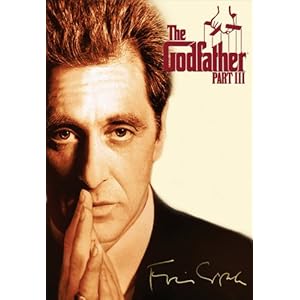
The Godfather: Part III probably shouldn't have been made. It's really not a bad movie at all; it has a decent cast and a few worthwhile moments. It also provided pop culture with one of its favorite lines about being brought back to something you thought you were done with. But all that probably wasn't worth putting a dent on the near-perfect reputation of the first two films. Francis Ford Coppola himself calls Part III an epilogue rather than the end of the story, and it's so distant from them that it hardly seems related in some ways. If I didn't know better I might have guessed that someone else directed it, and Al Pacino changed so much between the 70s and 90s that he might as well be a different dude.
The film depicts the transition of power from an aging Michael Corleone to his bastard nephew (who shouldn't actually exist according to the book) played by Andy Garcia, who takes on the same sort of role Michael had in the first film. Garcia's pretty good, but I think it's fair to say he's no young Pacino here. The rest of the original cast that bothered to show up does fine, and the new characters are okay too. Eli Wallach, best known as the Ugly part of The Good, the Bad and the Ugly, plays an old mob boss seemingly near the end of his life (amazingly, Wallach himself is still alive twenty years later) but still with a bone to pick, and is the most significant addition besides Garcia. The most infamous though is Coppola's own daughter Sofia playing Michael's kid, and while she's gotten a lot of praise for her direction in the last decade, there's a reason she sticks behind the camera now if you know what I mean. She isn't take-your-breath-away awful in every scene she's in, but she's bad enough to drag the film down, especially the end, which went in a totally idiotic direction that it didn't earn or execute properly.
The whole plot sort of ties into a couple real-life scandals involving the Catholic church around 1980, and the stakes just seem less important and interesting than anything from the first two films, while trying to be controversial or something. The other conflicts with mob families are resolved too easily, leading to the Vatican being positioned in a weird antagonistic way. I don't mind sequels to silly comedies and action movies as much as some people, but with something like this, I honestly don't get the point. Like I said, it's not a properly bad film. But I would say you should watch the first two movies, read the book to fill in the blanks, and if you're interested in seeing how Coppola and Mario Puzo decided the story should end, check this out, but only if you're willing to accept that the greatness that came before simply won't be there.
Friday, October 22, 2010
The Godfather: Part III
Monday, November 10, 2008
Jackie Brown

Jackie Brown is a bit of an oddity. It's Quentin Tarantino's third and probably least remembered film. One of the only stories he's done that wasn't his own, he took the plot from an Elmore Leonard novel (Who wrote many things that were adapted to screen, like 3:10 to Yuma) and reworked it into a tribute to 70's blaxploitation films, even starring a veteran of the genre, Pam Grier. Another big character is played by Robert Forster, who was also a long-time actor without a ton of success, and whom I only recognize from recent episodes of the increasingly-shitty Heroes. I guess Tarantino likes reviving people's careers. Some really big names (at least for the time) like Robert De Niro and Michael Keaton play smaller parts, but the movie focuses on Grier, Forster, and the always cool Samuel L. Jackson, who by the way turns 60 next month, can you believe that?
Anyway, Jackie Brown is a pretty solid crime movie, if not up to the standards of Tarantino's other work. It does a lot of things well that you expect from him, like clever dialogue that's just fun to listen to and some interesting decisions made with the filming. For some reason, I always seem to like the way he handles important scenes, especially violent ones. You can just sort of tell when something bad will happen, but it's still surprising to see how it actually comes about. Jackson is about as entertaining here as he was in Pulp Fiction, and the cast in general does a good job with the script.
On the other hand, the movie has some of the problems he's known for, too. If there's one thing he needs to learn as a filmmaker, it's how to let a scene go. Maybe he just needs a more assertive editor. Jackie Brown is indisputably too long. This isn't an epic crime drama, it just wants to be. It has all the makings of a tightly woven, thrilling movie, it just has an extra half-hour stapled on. Too many scenes don't really serve the plot, just add character where it isn't needed or go on for too long. Showing the same important moment from three different perspectives is a somewhat interesting creative choice, but there's no reason it couldn't have worked with all three cut together and a lot of time saved. It just sort of feels like an unnecessary flourish. And I know he likes to follow characters around with really long tracking shots, but I'm not sure anyone else does. Tarantino took a long break from directing after this movie, and I've never really heard why, and Kill Bill's running length suggests it wasn't to rethink his style. Whatever the reason, it wasn't because he made a decent if unexceptional genre film.

































